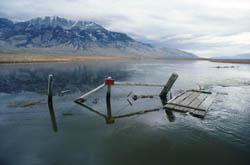Cooperating for better water quality
In Central Europe the cooperation among different institutions dealing with the problems of the marine environment needs to be enhanced. Hence, links with national and international research centres need to be strengthened. Furthermore the acquisition and flow of data covering the function of marine ecosystems and their sustainable development needs to be improved. Steps for improvement have already been taken through various activities such as seminars and workshops in cooperation with environmental officers and sanitary inspectors as well as training. Further to these, brochures, posters, TV programmes, interviews and press releases have evolved. As a result of these activities and products, public awareness of the potential threat associated with toxic algal blooms in drinking and recreation waters has increased. Additionally, the fact that these blooms are formed as a result of anthropogenic impact on the environment was made apparent. Local authorities have already undertaken actions aimed at the improvement of water quality in lakes used for recreation. Also a decision was made to establish the Regional Toxic Cyanobacteria Centre within the Institute of Oceanography. The goal of the Centre is to integrate and coordinate research projects, monitor programmes, disseminate knowledge on possible causes and consequences of toxic cyanobacteria development, and organise training sessions.



